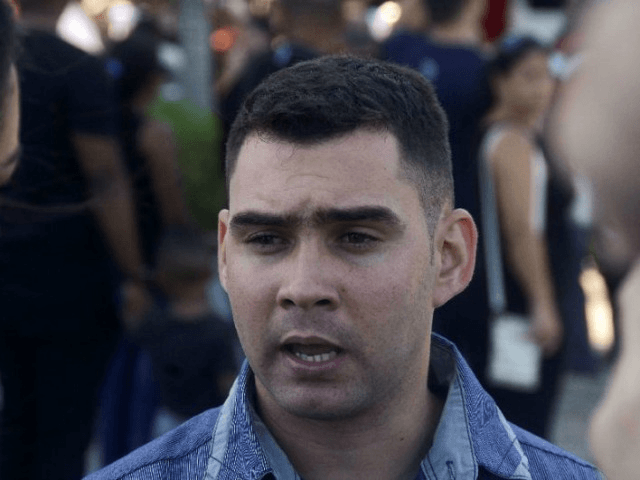Elián González, the former child refugee violently abducted by former President Bill Clinton’s far-left administration to serve as a mascot for the Cuban communist regime, expressed hope in an interview this week that, as a newly elected lawmaker, he could work to get the nation’s exiles to “come home.”
González became internationally well-known as a five-year-old in 2000 after his rescue in the Florida Straits. His mother died trying to bring González to America, fleeing communism in the balsero (“rafter”) crisis of the 1990s. Following his rescue, the American left and the Cuban government joined forces to demand his deportation back to communism. His father, Juan Miguel González, also demanded his return, using the Communist Party’s bully pulpit to lobby Clinton to take the child from his Miami-based extended family. The communists ultimately won when Clinton enacted a violent raid in which González was abducted at gunpoint and shipped back to Cuba.
González has since served as a public mouthpiece for the regime, encouraging the worship of late dictator Fidel Castro and demanding the American government embrace its human rights-abusing neighbor.
Last week, González, now 29, was one of 470 handpicked candidates to join the National Assembly of People’s Power, the Cuban legislature. As the Assembly has 470 seats, all 470 communists “won” their elections. González will join newly unretired 91-year-old dictator Raúl Castro in the lawmaking body, representing his hometown of Cárdenas, Matanzas, northeast Cuba.
Speaking to left-wing outlet CNN, González said that he would dedicate his tenure as an assemblyman to helping “bring the American and Cuban people together.”
“I am someone the American people know and I can help bring the American and Cuban people together and not just the people,” he said, “that our governments reach an understanding and remove all the barriers between us. Our country doesn’t have any sanctions on the United States.”
The Cuban Communist Party ardently opposes the poorly administered American “embargo” on its economy, which does not prevent massive influxes of remittances or block anything that could be defined as medical or otherwise humanitarian aid. The “embargo” does prevent America’s wealthiest corporations from exploiting ties to the communist regime so long as it continues to abuse the human rights of its citizens and traffic in property stolen in the early days of the Revolution, much of it from American citizens. According to the U.S. State Department, the Castro regime stole property currently worth about $8 billion dollars from Americans through “nationalizations.”
González told CNN that, in the long-term, his hope in politics would be to serve to bridge the gap between Cubans trapped on the island and the global diaspora.
“What we want one day is Cuban exiles are no longer exiled, that they come home,” González said. “When the young people that have left are willing to work for Cuba, the well-being of Cubans beyond a political party and beyond ideologies. … Our doors are open to build a better country which is what we need.”
González did not indicate that he would be open to reaching “beyond ideologies” with Cuban exiles by allowing the free expression of dissent from communism. The Castro regime has repressed any perceived or real political dissidence, including the practice of faith, since 1959, most recently brutalizing protesters and suspected protesters following the massive July 11, 2021, protests across the island. Last year, the communist regime held mass trials in which suspected protesters, including children, were sentenced to decades in prison for crimes such as “disrespect” and “counterrevolutionary thought.”
Prior to his “election,” González spent years appearing on Cuban state television encouraging the country to embrace the Cuban Revolution and its idols, which had long fallen out of popularity due to their widespread corruption and poor handling of the country. González made particular note in Cuban state media in February, when his “candidacy” was announced, of the fact that Raúl Castro would also be returning to power, stating, “Knowing that Raúl will be there doubles my joy because we will have experience and the example at our side still and I know I will be in that hall with our army general.”
González is also not a stranger to CNN, where he has offered public commentary occasionally in recent years. In 2017, the left-wing entertainment outlet published a “documentary” on González’s arrival and abduction from the United States in which the young man said that his “psychological burden” from being returned to Cuba was to “make my father proud, the Cuban people, the American people, Fidel, and the revolution which brought me home.”
“I don’t practice any religion. I haven’t studied any religion. But if I did, of course, my god would be Fidel. To me, there’s no greater person,” González claimed.
In 2020, González told Cuban state media that he would indoctrinate his own daughter in communism as he was, teaching her that mass murdering tyrant Fidel Castro was a hero.
“I will tell my daughter of the friend, brother, and father that I knew,” González said at the time. “The person who did not stop before an injustice in his efforts until seeing it resolved. Without forgetting the support he gave my father and how he activated an entire nation with the idea of having a boy return to his country with his family.”
Follow Frances Martel on Facebook and Twitter.

COMMENTS
Please let us know if you're having issues with commenting.